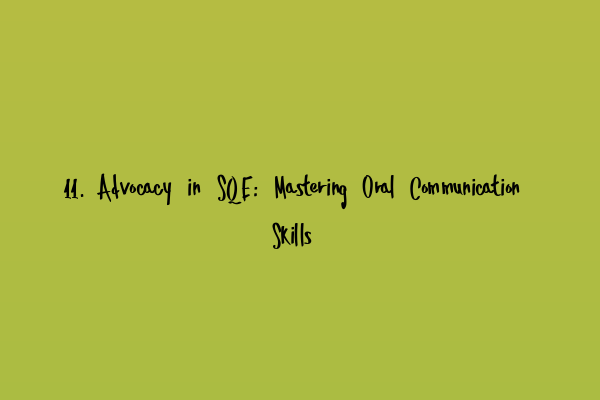Advocacy in SQE: Mastering Oral Communication Skills
Welcome to another informative blog post brought to you by SQE Exam Law, where we dive deep into various aspects of the Solicitors Qualifying Exam (SQE) to help you succeed in your legal career. Today, we will be discussing the importance of advocacy and how to master oral communication skills in the context of the SQE.
Before we delve into the details, it’s worth noting that effective advocacy is a fundamental skill for any solicitor. Whether you’re representing a client, arguing your case in court, or negotiating a settlement, the ability to articulate your position clearly and persuasively can make all the difference.
1. Understanding Advocacy in SQE
Advocacy in the SQE context refers to the ability to present a legal argument convincingly in both written and oral forms. While written advocacy is crucial, oral communication skills play a vital role in legal practice. It involves effectively presenting evidence, cross-examining witnesses, and making persuasive submissions in court.
2. Key Skills for Effective Advocacy
a. Clear and Concise Communication: As a solicitor, it’s essential to articulate complex legal concepts in a clear and concise manner. Avoid jargon and use plain language to ensure your message is easily understood by clients, opposing parties, and judges alike.
b. Active Listening: Listening attentively is an essential skill for effective oral communication. Paying attention to verbal and non-verbal cues will help you understand and respond appropriately to the speaker, fostering better communication and building rapport.
c. Confidence and Presence: Confidence is key when presenting your case in court or any other legal setting. Developing a confident and authoritative presence demonstrates your expertise and enhances your persuasive ability.
d. Body Language and Non-Verbal Communication: Your body language can have a significant impact on how your message is received. Maintain good eye contact, use appropriate gestures, and display open and engaged body language to convey professionalism and credibility.
e. Emotional Intelligence: Having emotional intelligence allows you to navigate difficult conversations, demonstrate empathy towards clients, and adapt your approach to different personalities and contexts.
3. SQE and Advocacy Skills Development
a. Oral Skills Workshops: Participating in SQE oral skills workshops can provide valuable hands-on experience in mock advocacy scenarios. These workshops often include exercises such as examinations-in-chief, cross-examinations, and submissions, allowing you to practice and improve your oral advocacy skills.
b. Client Interviewing and Counseling: Strong client interviewing and counseling skills are essential for effective advocacy. SQE courses typically include simulated client interviews and counseling sessions to help you refine your interpersonal skills and gather essential information from clients.
c. Mock Trials and Moot Courts: Engaging in mock trials and moot court competitions can provide a realistic courtroom experience where you can practice oral advocacy skills under simulated conditions. These activities also enable you to receive constructive feedback from experienced practitioners and fellow students.
d. Utilizing Technology: Technology has become an integral part of modern legal practice. Familiarize yourself with courtroom technology, such as video conferencing and audiovisual aids, as these skills will be valuable in an increasingly virtual legal landscape.
4. Conclusion
In conclusion, mastering oral communication skills is crucial for successful advocacy in the SQE and beyond. By practicing clear and concise communication, active listening, confident presentation, and effective use of body language, you can enhance your persuasive abilities and excel in your legal career.
To further equip yourself with the knowledge and skills necessary to succeed in the SQE, we recommend checking out our related articles:
– “24. Unlocking Knowledge with SQE Webinars: Expert Insights at Your Fingertips”
– “17. Review of SQE Course Providers: Choosing the Best Fit”
– “4. Unveiling the SRA Syllabus for the SQE”
– “31. Conquer the SQE: Insider Tips and Study Tricks for Success”
– “Grading System in SQE: Understanding How Exams are Evaluated”
Remember, effective advocacy is a lifelong skill that will serve you well throughout your legal career. So, start honing your oral communication skills today, and pave the way for a successful future as a solicitor.
